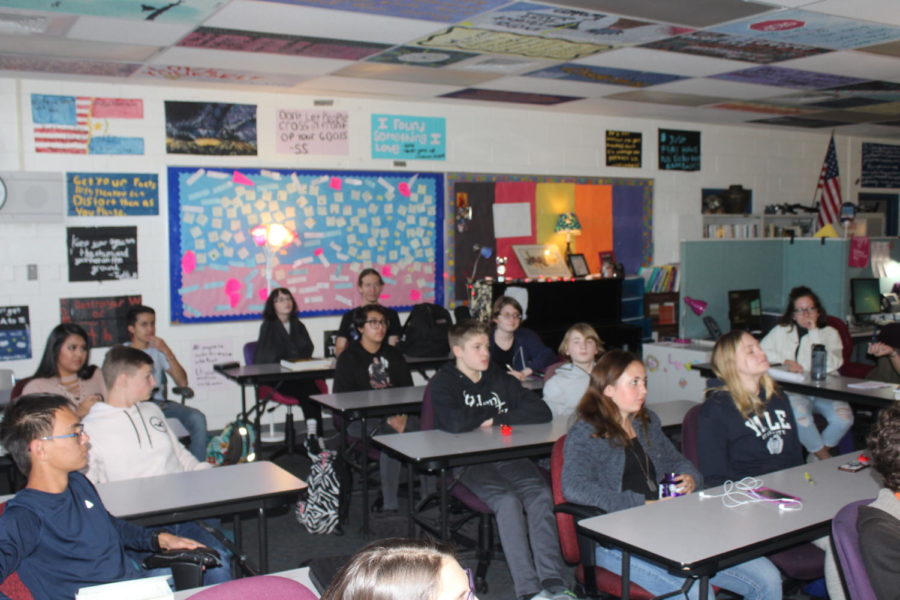Gifted and Talented Program Continues to Help Students Succeed
October 20, 2017
Wheat Ridge High School’s gifted and talented program has had a short yet fruitful life.
In the eight years since its initial establishment, the program has received national acclaim even with a small staff and low budget, and has seen exponential increase, further straining their already limited resources. Even with these challenges, the program has continued to help students achieve both in school and outside of it. According to Wheat Ridge High School Junior Zoey Womble, the school’s Gifted and Talented (GT) program provides “social and emotional” support for the students, many of whom have various social and emotional disadvantages. The program intends to give these kids a safe space to learn and make connections with other students, while offering rigorous and engaging coursework.
However, last year funding for the program was almost cut by the Jefferson County Board of Education, as well as funding for several elementary schools. The board ultimately decided to continue funding the program for the 2017-2018 school year, but after that, all bets are off. Though the board wouldn’t have directly ended the program, the cuts would have been made to staffing, removing the two teachers in charge of the class, functionally killing the program. This would be devastating to the students and staff involved with GT, and would end one of the district’s most prolific programs.
The proposed budget cut was an outrage to the students, many of whom protested at the school board meeting, wearing black and yellow shirts reading “We’ve got your back.” the outrage isn’t unfounded, as Wheat Ridge’s GT program has received national acclaim, drawing students from all over the district and beyond. The data backs this up, as over a three year period, from 2012-2014, the students of the program showed that “achievement growth for GT students at WRHS ranked first in Jeffco in math, reading and writing,” according to The Denver Post. The program has existed for less than a decade, having been started in 2009, and is already propelling its students to the top of academic achievement.
In an interview, GT teacher Lisa Lee stated that “the highest suicide rate among teens is GT kids, the highest dropout rate is GT kids.” She went on to say that with support, these kids can achieve great things and succeed in programs like AP, IB and Honors classes, but without support, they can be lost one way or another. This is very important work the program is doing, helping a silent and troubled minority of students who struggle with these issues.
Lee primarily focuses on freshmen and sophomores, while her partner Elliot Holm, focuses on upperclassmen. He has an initiative he refers to as “Adulting,” based on a book by Kelly Williams Brown, called Adulting: How to Become a Grown-up in 468 Easy(ish) Steps. The book, as the title suggests, is designed to help young people navigate the nuanced transition into adulthood. Holm has used the book to design a curriculum focused on helping his students learn practical skills, like applying for a loan or setting up a checking account, valuable abilities that aren’t taught in any traditional high school class that help his students succeed in college and beyond.
Coleman Erickson, a junior in GT, worries that the program’s resources are being spread too thin, as the program was only designed for each teacher to take on roughly 50 students. Due to the program’s success, students from all over the district and outside of it have flocked to the Wheat Ridge High School GT program, doubling the population since it was first started with no change in the program’s budget to support this growth.
Regardless of the budgeting crisis, the program is an acknowledged success. As a result a group of GT teachers and district budget officers from across the district, including Holm and Lee, has been established to review the district’s options for the continued funding of GT and decide on the best course of action. The first meeting is scheduled for November, and students, teachers, and alumni will be paying close attention to its recommendations.



Lisa Lee • Oct 24, 2017 at 10:34 am
Good Grief! This student has a future in journalism! I can’t wait to read more of his work in the future. His piece is balanced and accurate, and written so professionally that I felt I was reading the NYT. Great job! Thanks for a fair, positive article that articulates so much of what goes on here in the GT Center on the Farm.